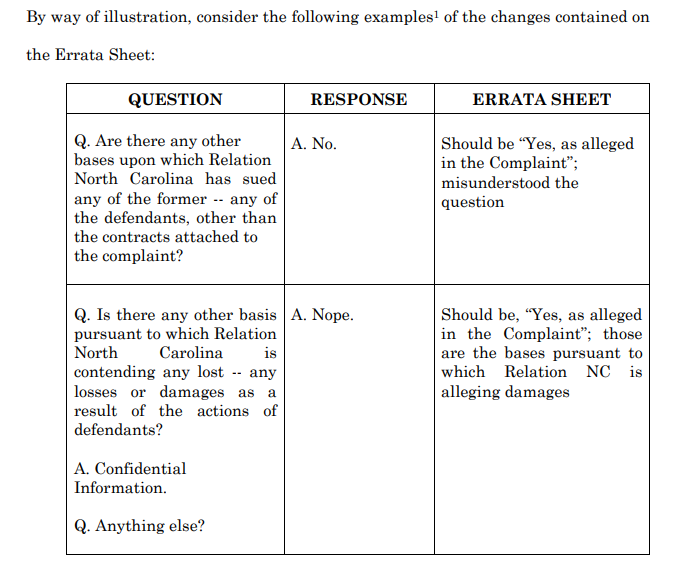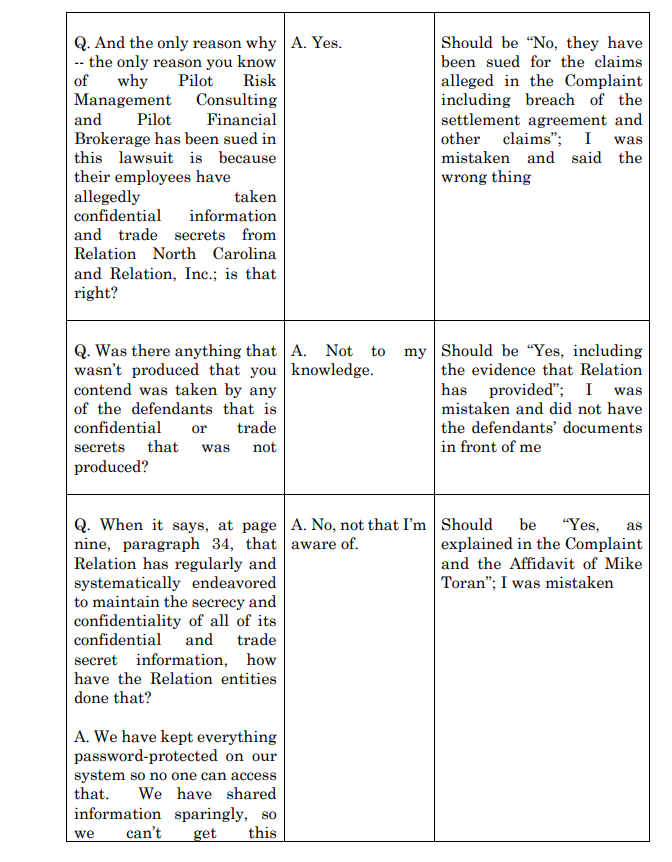It's not uncommon for a party deponent to give answers that are not helpful to a party's case. Lawyers spend a lot of time prepping witnesses and getting them ready to be deposed to make sure that doesn't happen, but sometimes, things go sideways in the heat of the moment.
The question then becomes how to fix it. Sometimes, lawyers will ask their own questions to clarify some muddled issues and get a better record. Sometimes lawyers will just let the testimony be and deal with the problems in another phase of discovery or at trial. And sometimes, lawyers will try to use an errata sheet to salvage things.
Judge Davis of the North Carolina Business Court was recently confronted with that issue -- can a party use an errata sheet to make extensive, substantive changes to their testimony? In Relation Insurance, Inc., et al., v. Pilot Risk Management, et al., a Plaintiff tried to do just that after a Rule 30(b)(6) deposition went a little sideways for them. The errata sheet made extensive changes to the substance of the testimony, such as:


The Court noted that no North Carolina court has held that a witness is barred from making substantive changes to their deposition transcript on an errata sheet. Such changes are contemplated by Rule 30(e) of the North Carolina Rules of Civil Procedure, after all. "If there are changes in form or substance, the deponent shall sign a statement reciting such changes and the reasons given by the deponent for making them." NCRCP Rule 30(e).
The Defendants moved to strike the errata sheet, based on federal case law interpreting the federal version of Rule 30(e). See, e.g., Thorp Revocable Tr. v. Ameritas Inv. Corp., 57 F. Supp. 3d 508, 518 (E.D.N.C. 2014) (“A change in ‘form’ would include correcting a typographical error or a spelling error. A change in ‘substance’ would include the substantive correction of a court reporter’s transcription (i.e., the witness answers ‘No,’ but the court reporter records ‘Yes’).”). The Court noted that this minority view makes logical sense - what is "the point of allowing deposition testimony in the first place if it can be so easily contradicted a short time later by the deponent himself." Relation Ins., Inc. v. Pilot Risk Mgmt. Consulting, LLC, 2023 NCBC 21, ¶ 18. Despite this logic, no North Carolina court has ever endorsed this reasoning, so the Court held it could not strike the errata sheet.
However, the Defendant was not left without relief. Based on its own precedent in Window World of Baton Rouge, LLC v. Window World, Inc., 2018 NCBC 79, the Business Court fashioned a remedy. It ordered a second deposition, two hours long entirely at the Plaintiff's expense, on any substantive changes to the prior deposition made in the errata sheet and the reasons therefore. It also kept the original responses in the record and available for impeachment purposes, and allowed the Defendants to challenge the substantive changes at the summary judgment stage, to the extent Plaintiff relies upon them.
The lesson here? Prep your witnesses on the front end to give truthful responses and you hopefully won't find yourself in this position. While you might be able to make substantive changes on an errata sheet in North Carolina, if you are in the Business Court, you should be cautious about changing too much. Extensive substantive changes reflect poorly on all involved, lawyer or deponent. If you get too cute, the Business Court is not afraid to make you answer for it on the record and at your client's expense.
Full opinion please click here.




/Passle/5fe0c4f453548a10fc881e09/SearchServiceImages/2025-03-31-20-40-41-549-67eafdc99050990b49b48356.jpg)
/Passle/5fe0c4f453548a10fc881e09/SearchServiceImages/2025-02-17-20-16-07-617-67b39907c56ef846c927f846.jpg)
/Passle/5fe0c4f453548a10fc881e09/MediaLibrary/Images/2025-05-05-20-53-03-372-6819252fda001553f92c4ae0.png)